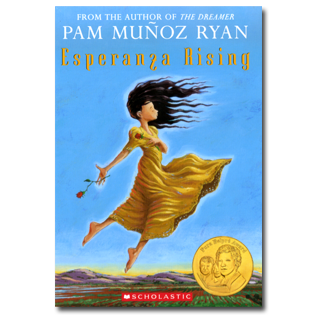
A FEW OTHER EVENTS FOR
MAY 12:
- Happy birthday Farley Mowat (Never Cry Wolf), Caroline Feller Bauer (My Mom Travels a Lot), Betsy Lewin (Click, Clack, Moo), Janice Lee Smith (Adam Joshua Capers series), and Jennifer Armstrong (Shipwreck at the Bottom of the World).
- It’s the birth date of Edward Lear (1812-1888), The Owl and the Pussycat. In honor of Mr. Lear, it’s Limerick Day, celebrating the humorous and witty five-line poem. Read His Shoes Were Far Too Tight by Edward Lear by Daniel Pinkwater, Limericks by Valerie Bodden, Pocketful of Nonsense by James Marshall, and Lots of Limericks by Myra Cohn Livingston, illustrated by Rebecca Perry.
- Florence Nightingale (1820-1910) was born on this day. On a related note, it’s International Nurses Day. Read Heart and Soul: The Story of Florence Nightingale by Gena K. Gorrell.
In an ongoing effort to promote books by Latinos, the Association of American Publishers has designated May as Latino Book Month. During May they hope booksellers, librarians, and teachers will encourage people in their communities to read Latino books in both English and Spanish. Later in the month we’ll look at a book by Francisco Jiménez. Today I’d like to focus on a book by a Latino writer that seems guaranteed to achieve classic status, Pam Muñoz Ryan’s Esperanza Rising.
Like many authors hunting for inspiration, Muñoz Ryan pulled from the stories told in her family, particularly those of her Abuelita (grandmother), Esperanza Ortega. Even late in her life, when Esperanza talked about first coming to the United States from Mexico as a teenager she would cry. Pam began to fashion a protagonist based on her grandmother, weaving in other family experiences and some of her own as well.
Right before her thirteenth birthday, Esperanza faces a terrible tragedy—the death of her beloved father. Suddenly she and her mother find their fortunes reversed. Once wealthy land owners in Mexico, they must now rely on former servants to help them to immigrate to the United States and find work in a migrant camp in California. At first Esperanza can barely tolerate the cramped conditions and lack of autonomy. She naturally misses the feasts, the dresses, the accoutrements of being a privileged young girl. But because she loves her mother, she begins performing manual labor even though she has to be taught how to hold a broom. Eventually, when her mother grows ill and must stay in a hospital, Esperanza does backbreaking work in the fields, in hopes of saving enough money to bring her grandmother to America.
For a novel to be truly satisfying, the character needs to change in a believable way over the course of the narrative. Esperanza becomes a different human being—a kinder, more appreciative, more caring individual. Rather than hoarding her own few possessions, she gives away a beloved doll to help another little girl in pain. In 1930, when Mexicans went on strike for better wages but often get deported for doing so, Esperanza learns to look beyond the politics of the time to the human issues—everyone is simply trying to feed their family. Just like the person on whom her character was based, Esperanza finds someone to love, a former servant of her father’s.
As Pam Muñoz Ryan states in a superb author’s note, Esperanza means “hope” in Spanish. The hopes of immigrants to this country, their dreams, and their triumphs have never been as clearly captured as in this book. It is small wonder that Esperanza Rising has moved into the curriculum for fourth through ninth grade. It reminds all its readers that human beings can live with dignity, no matter the conditions, as long as family and community remain intact.
Few who read this powerful book forget it. The final line gives me inspiration every day, “Do not ever be afraid to start over.”
Here’s a passage from Esperanza Rising:
Mama and Esperanza walked into the cabin. It had two small rooms. One half of the front room was the kitchen with a stove, sink, and counter, and a table and chairs. A pile of wood waited near the stove. Across the room was a mattress on the floor. The back room had another mattress big enough for two people and a tiny cot. In between sat a wooden fruit crate, to be used as a night table, its sides touching each bed. Above was another small window.
Mama looked around and then gave Esperanza a weak smile.
“Is this our cabin or Hortensia’s and Alfonso’s?” asked Esperanza, hoping that hers and Mama’s might be better.
“We are all together in this cabin,” said Mama.
“Mama, we can’t possibly all fit!”
Originally posted May 12, 2011. Updated for .






One of those books that I didn’t want to end, I loved the characters so.
I sat in a hospital where my surgeon was delayed five hours from an unexpectedly long first operation. I hardly noticed that I was the only patient left and most of the staff had gone because I was deeply in another world reading Esperanza Rising, a powerful testament to the dignity and vitality of the human spirit.
I only buy my very favorite books in hardcover after reading them free from the library. ESPERANZA RISING falls into that category and has a place on my bookshelf.
This sounds like a wonderful book.
And Melody, I am in absolute awe of anyone who can calmly be absorbed in any book, while waiting for surgery. It must be one darned good read. If I were the author, I would print out your comment, and frame it,
Also check out The Dreamer, Pam Munoz Ryan’s beautiful collaboration with Peter Sis about the poet Pablo Neruda. An absolutely stunning book!
It was this cover, and this title that drew me to this book. It’s even more powerful of a story. Definetly one that makes me tear up a little. Strength.
I have read everything this author has written, the classic status is a shoo in!